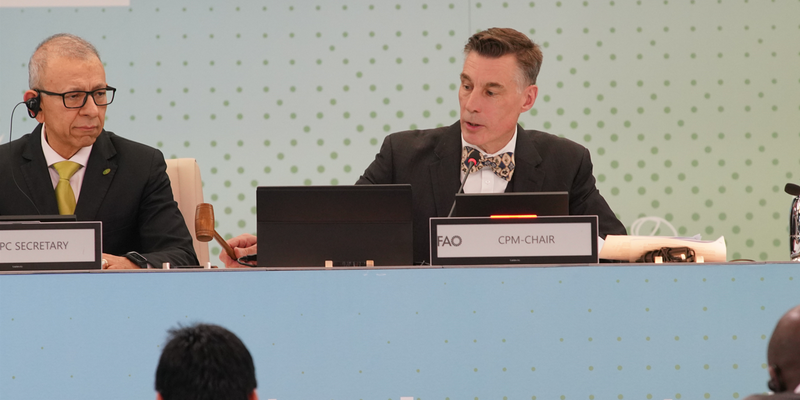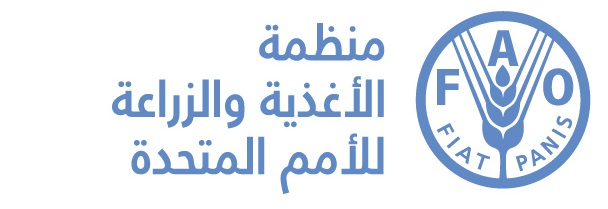CPM-18 builds momentum for robust global plant health systems
Posted on إثنين, 29 إبريل 2024, 08:24

©FAO/Thomas Toti / Greg Wolff (right) the Chair of CPM brings down his gavel to mark the adoption of the CPM-18 report. Left is Osama El-Lissy, IPPC Secretary
Rome, 24 April 2024. The 18th Session of the Commission of Phytosanitary Measures (CPM-18) concluded with applause to the plant health community, on the outstanding progress made in advancing phytosanitary excellence and commitments to promote stronger and more efficient phytosanitary systems globally. Nearly 400 delegates from the International Plant Protection Convention (IPPC) contracting parties and 20 observer organizations, including representatives of 10 regional plant protection organizations (RPPOs) and FAO regional plant health officers, met from 15-19 April 2024 in Rome, Italy to discuss the global status of plant health and actions to improve phytosanitary systems and capacity around the world.
CPM-18 was officially opened by QU Dongyu, Director-General of the Food and Agriculture Organization of the United Nations (FAO), which hosts the IPPC Secretariat. He highlighted the importance of the work of CPM and the IPPC in safeguarding plants, ecosystems and global food security, noting that plant health standards are the starting point for the development of food safety and animal health standards.
Chairing CPM for the first time, Greg Wolff, thanked the IPPC community for the immense work in protecting plant resources from pests and commended contracting parties, donors and partners for their voluntary contributions and donations to the IPPC mission. He expressed an urgent need for sustainable funding of IPPC and CPM activities, including raising the profile of plant health through effective communications, international collaboration, and strategic discussions such as One Health.
Lawrence MacAulay, Minister of Agriculture and Agri-Food in Canada and Asad Abdirisak Mohamed, State Minister of Agriculture and Irrigation in Somalia delivered keynote addresses. MacAulay lauded the IPPC and CPM for being “champions of science and rules-based trade”. He pledged Canada’s continued support to the IPPC mission. Minister Mohamed, whose country joined the IPPC as its 185th member, underscored the importance of collaboration in addressing crop production challenges.
In his report, Osama El-Lissy, IPPC Secretary outlined the achievements of the secretariat and thanked donors, partners and contracting parties that support the work of the secretariat, financially and in-kind.
Winning for plant health
CPM-18 listened to reports from its subsidiary governing bodies and CPM Focus Groups, making several endorsements to advance the IPPC. Modifications to four International Standards for Phytosanitary Measures (ISPMs) were adopted: 2022 amendments to ISPM 5 (Glossary of phytosanitary terms); Annex 1 (Criteria for evaluation of available information for determining host status of fruit to fruit flies) (2018-011) to ISPM 37 (Determination of host status of fruit to fruit flies ((Tephritidae)); revision of ISPM 4 (Requirements for the establishment of pest free areas) and Phytosanitary Treatment 46 (Cold treatment for Thaumatotibia leucotreta on Citrus sinensis) (2017-029), as Annex 46 to ISPM 28 (Phytosanitary treatments for regulated pests). Also adopted was the CPM recommendation on minimizing pest risk associated with the sea-container pathway.
Concerning the IPPC ePhyto Solution that helps countries to trade faster and safer by replacing paper phytosanitary certificates with digital ones, CPM-28 approved a long-term funding model to ensure sustainability of the tool. Since its establishment in 2019, the ePhyto Solution has enabled exchange of over six million ePhytos (electronic phytosanitary certificates), with 132 countries connected to its central server, including 53 through the Generic ePhyto National System (GeNS). More countries are expected to connect in 2024.
The Implementation and Capacity Development Committee report outlined achievements including development of IPPC guides and training materials, introduction of new e-learning courses, successful implementation of Phytosanitary Capacity Evaluations (PCE) and increasing awareness and actions to prevent pest spread through e-commerce. CPM encouraged contracting parties to provide resources for pest outbreak alert and response system activities and the other under-financed activities, such as the IPPC’s global Fusarium TR4 coordination, the IPPC Observatory and sustainable PCE activities.
CPM-18 endorsed the Africa Phytosanitary Programme (APP) as an innovative approach empowering national governments with the technical capacity and support necessary to manage plant pests of regulatory, environmental, and economic significance effectively and consistently. The pilot phase of APP is underway in 11 African countries and during CPM-18, more African countries, expressed interest in joining the next phase. CPM delegates supported the continued development of APP, with the potential vision for it to become a global phytosanitary programme. The United States of America, through the United States Department of Agriculture (USDA), the United Kingdom and the European Union pledged financial and technical support to APP.
CPM-18 noted updates on the IPPC’s eight Development Agenda Items, including developing a robust pest outbreak alert and response system, developing ISPMs that are specific to widely traded commodities. Other emerging topics were the role of plant health in the One Health concept, managing the impact of climate change on pests, ensuring compliance with standards in provision of food aid and the secretariat’s survey on the use of antimicrobial products in plant protection.
Knowledge sharing'

Delegates listen to the success story from Uzbekistan. On-screen, the Uzbekistan president visits the NPPO. ©FAO/Anita Tibasaaga
Being a forum of like-minded parties, five countries shared their experiences in conducting Fusarium Tropical Race 4 (TR4) simulation (Nicaragua); using remote microscopy systems (Philippines); adopting the ePhyto Solution (Argentina and Uganda); and conducting PCE (Uzbekistan).
A science session on case studies of systems approaches gave insights on experiences in implementing ISPM 14 (The use of integrated measures in a systems approach for pest risk management). Rieks van Klinken from the Commonwealth Scientific and Industrial Research Organisation talked about “Best practices and quantitative perspectives”, while Martin Edgardo Delucis from Argentina's Servicio Nacional de Sanidad y Calidad Agroalimentaria (SENASA), shared his country's “Lessons learned, and challenges faced”.
Cory Penca and Justin Wall from USDA's Animal and Plant Health Inspection Service (APHIS) presented on the US experience with using a systems approach for export and import purposes, respectively.
CPM noted the importance of systems approaches in providing an appropriate level of protection for importing countries, equivalent to other phytosanitary measures such as quarantine treatment.
Related information

